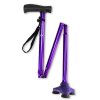lunarainbows
Senior Member (Voting Rights)
Hi, I went to a rheumatologist appt last week and he asked me if I could walk unaided, or used a walking stick or aids. I told him I could walk unaided (and showed him by walking to the door and back), but that for longer distances eg within the home I sometimes used a rollator for a very short time. (I’ve worked really hard on physio the past few months to get this far.  )
)
My question is, does using a rollator and/or walking stick or crutches (I’m sure I’d have to practice & only build up slowly), help people to walk for longer? Could it help me?
Does anyone use a walking stick or rollator or any other aids to walk, for short or long distances? I don’t really hear of that many people with ME using them and I’m not sure why? (I only usually hear of people with EDS & other chronic conditions using them).
Could it help with redistributing weight, help feel less dizzy & unbalanced, and help with pain in the legs? Or what exactly is it supposed to help with? I hadn’t even considered them until the doctors asked about them when assessing my function. I’ve never had a proper OT assessment which focused on this, only one that dealt with housing.
Interested in thoughts or experiences with any aids!
(Edited to add crutches)
My question is, does using a rollator and/or walking stick or crutches (I’m sure I’d have to practice & only build up slowly), help people to walk for longer? Could it help me?
Does anyone use a walking stick or rollator or any other aids to walk, for short or long distances? I don’t really hear of that many people with ME using them and I’m not sure why? (I only usually hear of people with EDS & other chronic conditions using them).
Could it help with redistributing weight, help feel less dizzy & unbalanced, and help with pain in the legs? Or what exactly is it supposed to help with? I hadn’t even considered them until the doctors asked about them when assessing my function. I’ve never had a proper OT assessment which focused on this, only one that dealt with housing.
Interested in thoughts or experiences with any aids!
(Edited to add crutches)
Last edited:


